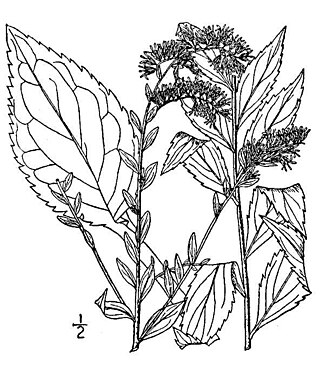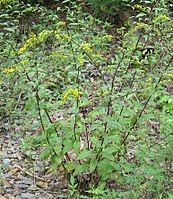
Solidago canadensis, known as Canada goldenrod or Canadian goldenrod, is an herbaceous perennial plant of the family Asteraceae. It is native to northeastern and north-central North America and often forms colonies of upright growing plants, with many small yellow flowers in a branching inflorescence held above the foliage. It is an invasive plant in other parts of the continent and several areas worldwide, including Europe and Asia. It is grown as an ornamental in flower gardens.

Solidago sempervirens, the seaside goldenrod or salt-marsh goldenrod, is a plant species in the genus Solidago of the family Asteraceae. It is native to eastern North America and parts of the Caribbean. It is an introduced species in the Great Lakes region. Similar plants found in the Azores are thought have evolved from a natural introduction of this species.

Solidago nemoralis is a species of flowering plant in the family Asteraceae. It is native to North America, where it is widely found in Canada and the United States. Its common names include gray goldenrod, gray-stem goldenrod, old-field goldenrod, field goldenrod, prairie goldenrod, dwarf goldenrod, and dyersweed goldenrod.

Solidago rugosa, commonly called the wrinkleleaf goldenrod or rough-stemmed goldenrod, is a species of flowering plant in the family Asteraceae. It is native to North America, where it is widespread across eastern and central Canada and the eastern and central United States. It is usually found in wet to mesic habitats.

Solidago speciosa, the showy goldenrod, is a North American species of flowering plants in the family Asteraceae. It grows in the province of Ontario in central Canada, as well as in the eastern and central United States.

Solidago guiradonis is an uncommon species of goldenrod known by the common name Guirado goldenrod. It is native to the Central California Coast Ranges of central California, in southern San Benito and western Fresno Counties.

Solidago multiradiata is a species of goldenrod known by the common names Rocky Mountain goldenrod, northern goldenrod, and alpine goldenrod. It is native to North America, where it can be found throughout the northern regions, including Alaska and most of Canada (all 3 territories plus all provinces except Prince Edward Island, including territory north of the Arctic Circle. Its distribution extends through the western United States as far south as Arizona, New Mexico, and California. It is known mostly from the subalpine and alpine climates of high mountain ranges. Its habitat includes tundra and mountain meadows.

Solidago spectabilis is a species of goldenrod known by the common names Nevada goldenrod, basin goldenrod, and showy goldenrod. It is native to the western United States in the Great Basin and surrounding areas. It is found in California, Arizona, Nevada, Oregon, and Utah. There are historical records saying it once grew in southwestern Idaho, but is now extirpated there. This variety has also been seen in the western Montana county of Sanders.

Solidago spithamaea is a species of flowering plant in the family Asteraceae known by the common name Blue Ridge goldenrod. It is native to a very small region around the border between North Carolina and Tennessee in the United States. Its three remaining populations are threatened by the loss and degradation of its habitat. It is a federally listed threatened species of the United States.

Veratrum hybridum is a species of flowering plant in the Melanthiaceae known by the common names slender bunchflower and crisped bunchflower. Many publications use the synonyms Melanthium latifolium and Veratrum latifolium, but the "hybridum" epithet is 9 years older than the "latifolium," so Veratrum hybridum is now the accepted name.

Solidago missouriensis is a species of flowering plant in the family Asteraceae known by the common names Missouri goldenrod and prairie goldenrod. It is native to North America, where it is widespread across much of Canada, the United States, and northern Mexico. It grows from British Columbia east to Manitoba, south as far as Sonora, Coahuila, Texas, and Mississippi.

Solidago villosicarpa is a species of flowering plant in the family Asteraceae known by the common names hairy-seed goldenrod, coastal goldenrod, glandular wand goldenrod, and shaggy-fruit goldenrod. It is endemic to North Carolina in the United States, where there are only four known populations.

Solidago velutina, the threenerve goldenrod or velvety goldenrod, is a plant species native to Mexico and to the western United States. The species has been found in southwestern Oregon, east to the Black Hills of South Dakota, and as far south as México State in the central part of the Republic of México. It is classified as a member of Subsection Nemorales.

Solidago simplex, the Mt. Albert goldenrod or sticky goldenrod, is a North American plant species in the genus Solidago of the family Asteraceae. It is widespread across much of Canada, parts of the United States, and northeastern Mexico.

Solidago rigida, known by the common names stiff goldenrod and stiff-leaved goldenrod, is a North American plant species in the family Asteraceae. It has a widespread distribution in Canada and the United States, where it is found primarily east of the Rocky Mountains. It is typically found in open, dry areas associated with calcareous or sandy soil. Habitats include prairies, savannas, and glades.

Solidago curtisii, commonly called Curtis' goldenrod and mountain decumbent goldenrod, is a North American species of flowering plants in the family Asteraceae. It is the eastern part of the United States from Pennsylvania to Mississippi and Alabama, primarily in the southern Appalachian Mountains.
Solidago faucibus, the gorge goldenrod, is North American species of flowering plants in the family Asteraceae. It was recognized as a distinct species in 2003. It is found primarily in the southern Appalachian Mountains of the southeastern United States, in the states of Virginia, West Virginia, Kentucky, Tennessee, and South Carolina. It is found in mesic forested gorges, often growing under Tsuga canadensis.

Solidago latissimifolia, common name Elliott's goldenrod, is North American species of flowering plants in the family Asteraceae. It is native to the Atlantic Coast of the United States and Canada, from Nova Scotia south to Alabama and Florida.

Solidago roanensis, the Roan Mountain goldenrod, is a North American species of goldenrod in the family Asteraceae. It is native to the eastern United States, primarily the Appalachian Mountains from Pennsylvania to Georgia, with some populations in the lowlands of South Carolina.

Solidago ulmifolia, commonly known as elmleaf goldenrod, is a North American species of goldenrod in the family Asteraceae. It is found in Canada and the eastern and central United States.






















